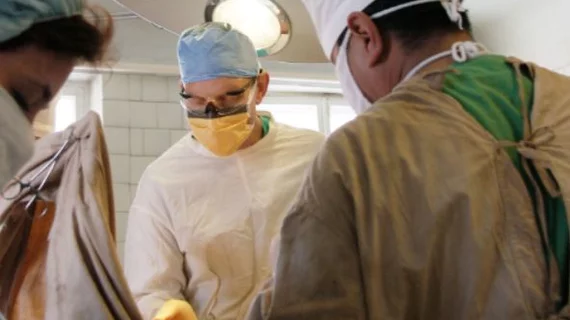Smart glasses take the neck pain out of fluoroscopic image-guided surgery
Researchers out of Japan have created "smart" glasses to display real-time fluoroscopic images within a surgeon’s field of vision. The device improves surgical efficiency while also decreasing radiation exposure.
Doctors with Murayama Medical Center in Tokyo unveiled their device, which attaches to a normal pair of glasses, Tuesday in the Journal of Neurosurgery: Spine.
“The smart glasses display system [can be] used as an alternative screen in front of surgeons' eyes allowing them to see both the surgical field and information displayed on monitors simultaneously without moving the eyes and head,” Keitaro Matsukawa, MD, PhD, and Yoshiyuki Yato, MD, PhD,” said in a statement. Matsukawa is also a consultant for the device manufacturer, Westunitus.
For the pilot study, a surgeon tested the device during 10 minimally invasive spinal surgeries and relied on a fluoroscopic video display in 10 others.
The researchers found the clinician turned toward the monitor fewer times when using the glasses (0.1 times versus 82.4 turns) and recorded only 38.6 seconds of radiation exposure compared to the 41.8 seconds when using a monitor. Surgeries were also slightly shorter (100.2 minutes) with the eyeglasses compared to the physical display (105.5 minutes).
During the study, only one intraoperative complication—a screw perforation—was recorded during a fluoroscopic monitor-led surgery.
The constant need for surgeons to turn their heads can be distracting, resulting in technical difficulties and potential errors, the authors noted. They believe their device may be a “valid” option for surgeries going forward.
“We believe the major advantages are 'concentration' and 'information centralization,” the pair said in a statement. “The eyeglass-attached display device can be a great tool to help surgery progress smoothly and safely."

